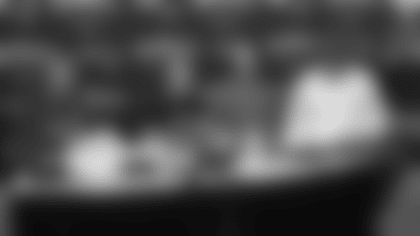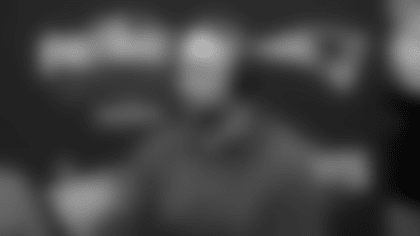[

]()
Q: Coach, how important is the coach-quarterback relationship?
DV: Well, to me, I've always believed it's very critical. I've found that very few quarterbacks can be successful if they don't believe that the head coach believes in them. There are enough people in all phases of the NFL world trying to create doubt in a quarterback's mind, and I think some of them have failed because of the doubt that they could play from within themselves generated to the point that they couldn't play. If it starts with the coach, you're in real trouble. You know you're going to get it from the media. There's always going to be a writer in every town that's going to zero in on somebody, and if it's you're quarterback, that's a problem. It makes the development of the quarterback much tougher. I really believe that it's not impossible, but almost impossible for a quarterback to be successful in a situation where the coach doesn't really believe in him.
Q: Can you comment on the Patriots' season that they had last year?
DV: Well, I really, really respected what they did last year. I followed them and then I studied them in the off season. I've coached a long time and I thought that that was the best coaching job that I have seen done in the National Football League since I've been in the league. I started in the league in 1969. I'm not saying that to flower Bill [Belichick] or anybody else, it's just I know that when the season was over I sat down and wrote him a note and wrote the owner a note. They're both great people and I respect what other people do in my profession extremely well. It may not have meant a damn thing, but it meant something to me. You build a championship organization, not a championship team. The whole organization succeeds and that's why you end up with a world championship, I think. They've got it running. You watch the players and they play with great confidence, great definition and purpose in what they're doing both offensively and defensively and on special teams. Right now, I think they're the best team in football. Will they do undefeated? That's going to be tough to do. Sixteen weeks, injuries, ups and downs, all kinds of variables. But they're an outstanding football team.
Q: It seems like teams are already borrowing from their defense. Do you think teams will start to borrow from their offense, and also from their front office, too?
DV: I wouldn't be surprised. There's a term used by a lot of people in this league: ESR. Economical Salary Risk. The older guys tend to be those guys on your roster that end up being economical salary risks. They're the guys that you get them, they can play pretty well, and bang, they're hurt. So there are programs that you're concerned about if you have too many of them. Where New England has done a great job is in making sure that they pick the right veteran-type player. You've got Roman Phifer. I coached Roman Phifer for two years with the Rams and I loved him. He was a darn fine football player for me. He never missed a snap and he was just a hard working young man. He takes great care of his body. So there's less risk when you provide an opportunity for a man with his years and experience. There's less risk involved with that kind of guy. You take another guy and look at his career and he's had six different operations and all these things and you add him to you roster because you know he can play, then he's gone three games and all of a sudden, he's out for the season and you've got him on your salary cap. That's tough.
Q: How has Priest Holmes held up to expectations after leading the league in rushing last year.
DV: Well, guys, when I came here, they had running back by committee. I've never believed in that. Now, I don't say that's wrong, I really don't. There are a lot of ways to do things and certainly not all of the things that I do are right. But I've never believed in it. We went out and looked for a running back that we felt we could win the AFC championship with. I felt we could win it with Priest Holmes. He averaged over 4.3 yards a carry at the Ravens. He had 1,008 yards rushing in just over 200 carries. But they wanted a bigger-type back. I felt we could win an AFC championship with him as our ball carrier. So we went after him. I didn't expect him to lead the league in rushing. I didn't expect him to lead the league in total offense. But it won't surprise me, and it didn't then, if he would be one of the top five or six running backs. The big criteria is if he's a darn good running back, how many times does he get to carry it and if he can stay healthy for 16 games. I'm surprised that he did the other two things, but I'm not surprised that he's one of the top running backs in the league.
Q: What's your estimation of Mike Cloud?
DV: I think Mike Cloud's a starter in the NFL. I think if Priest Holmes went down, Mike Cloud would step in and play very well. There are certain things that Mike Cloud has and can do that Priest Holmes can't do. He's faster than Priest Holmes. When you put Mike Cloud in the ball game, there's an extra burst of speed that's glaring. Mike Cloud's an outstanding young man with a great work ethic, and he's patient. He's patient. He's not sitting here hoping that Priest Holmes is going to get hurt, but he's ready to go. He's going to be a free agent next year and he may not be here next year. I would support him in any way. I'd like to have him here, because he's a great security blanket. He's not as elusive and he can't make a four-yard play as consistently an eight or nine yard play as Priest Holmes can do, and those kind of things. But he's liable to make a 10-yard play an 80-yard play.
Q: The Patriots have not had all of their starters available for all of each of their games. Can they continue to play this well if they need to have their backups playing?
DV: Well, I think they can, because part of their success if their scheme. You need to have players and believe me, players win games, not coaches. But I think there are things you do within schemes that enhance the ability of your players and your backup players to play well. Now if the backup players had to play eight weeks in a row, then maybe it catches up with them. But if they had to come in and play well two weeks in a row, it's hard for some offensive team to exploit when it's not quite as good as their starter. Sometimes, there's not much difference between a specific defensive player and another defensive player. Where you really notice a great difference is if all of a sudden you lose your best corner, or all of a sudden you eliminate your best pass rusher. A dominating-type player or your upper-echelon player or a player you might have a franchise tag on. A player that you're putting a ton of money into. But there have been a lot of football games won with two or three backup players playing in the lineup at that time. Almost every big game that I have ever experienced – the Rose Bowl, the Super Bowl, the NFC Championship Game – one of my starters did not play in the game. Someone has to be able to step up and fill that job. If it isn't your quarterback and it isn't your number one pass rusher or if it isn't someone like that, you're probably still a very functional team.
Q: From what you've seen, what makes the Patriots such a hard team to run against?
DV: Well, first off, they're fundamentally sound. They're very good knee-benders. Their linebackers get under people and when you bar out to block them as they flow, they can stop the offensive line and just cut them, knock them off balance. They ricochet well. They gang-tackle well. I think that is the number one thing. They swarm and they can some down into eight-man fronts from seven-man fronts very quickly. You don't always know how they're going to end up or the way they end up. They give you a look and they end up with the run support contrary to what you thought it was going to be. So it's the scheme, but I think also the fundamentals within their scheme, the players' fundamental skills and techniques are awfully sound.
Q: Bill has talked to his team and his players are very aware that Indianapolis was 2-0 coming here last year and the Patriots were 0-2. It was kind of a turning point for both teams. What are you telling your team to motivate them to take on a Super Bowl Champion?
DV: Well, for my team, it's great to have an opportunity to play against the best. If you want to check a test and find out where you are, for your individual position and collectively on the side of the ball that you play and then collectively as a team, if you want to find out how far you've come, play against the best. It will get defined quickly.
Q: Earlier, Coach Belichick was talking about the difference and complexity of your schemes when you were in Philadelphia and previously when you were in St. Louis. What dictated the change to make a much more complex offense?
DV: Well, it was a long time ago when I was in Philadelphia. But, we're running the same offense, really, except we do five times as much. The same pass offense mechanics, the same numbering system, the protections are called differently and that kind of stuff, but we do far more. Far more. My last couple of years there, with Sid Gilman and I working it, we got into a lot of formation variations and movement and shifting and all that kind of stuff. But we do five times as much in every game plan as we did then. That's the difference. The Rams, we moved into the same pass offense and mechanics and system and the running plays and that kind of stuff, but again, so much more. At the Rams, we were so skilled by the end of the third year at the wide receiver positions and then with Marshall Faulk, that there was more emphasis on the passing game. Not that we didn't want to run, because I like to run the football, but there was more emphasis on the passing game. Here, first off, we have to do what we have to do to win. If we have to call for 60 passes, then that's what we do. But what we try to do, because Priest Holmes is our talented guy in the backfield, we make sure that he has an opportunity to touch the ball between 25 and 30 times a game, and a few times maybe even more between running and pass receiving. Then you go to Tony Gonzalez. You've got to get the ball in Tony Gonzalez's hands. You've got to utilize your weapons. Our receivers here are getting better and what we didn't do a very good job of last week is getting the ball in the hands of our wide receivers. We have to have better definition in getting that phase done. But we are much more complex. We have everything we had at the Rams, although I'm not Mike Martz and they do a wonderful job with their stuff. But I would like to keep running the ball some.
Q: What did you write in that note to Belichick?
DV: I just told him that I respected the job and I thought it was just like I told you guys. I thought it was the best coaching job that I've seen. I respect my profession. I've been in it since 1959. From high school to junior college to college to the pros. I've always tried to acknowledge somebody that I have seen do a job that I admire. That was all, just a very simple note. That's all. I don't know Bill real well, I know Bill Parcells extremely well and I know Bill had tremendous respect for him and so I know him through my profession. And the family that owns the football team, every time I've been around them, they've always shown tremendous class. It was just so good to see some real, nice, class people win it all.
Q: Dick, thanks a lot. We really appreciate your help.
DV: All right










































